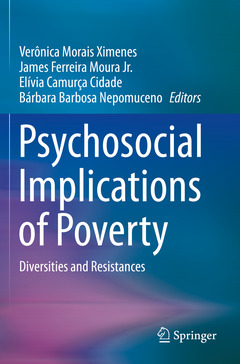Psychosocial Implications of Poverty, 1st ed. 2019 Diversities and Resistances
Coordonnateurs : Ximenes Verônica Morais, Moura Jr. James Ferreira, Cidade Elívia Camurça, Nepomuceno Bárbara Barbosa

The studies presented in this contributed volume depart from the theoretical framework developed by Critical Social Psychology, Community Psychology and Liberation Psychology, in an effort to understand poverty beyond its monetary dimension, bringing social, cultural, structural and subjective factors into the analysis. Psychological science in general has not produced specific knowledge about poverty as a result of the relations of domination produced by social inequalities fostered by the capitalist system. This book seeks to fill this gap by presenting a psychosocial perspective with psychological and sociological bases aligned in a dialectical way in order to understand and confront poverty.
Psychosocial Implications of Poverty ? Diversities and Resistances will be of interest to social psychologists, sociologists and economists interested in multidimensional studies of poverty, as well as to policy makers and activists directly working with the development of policies and strategies to fight poverty.
Introduction
Part I - Critical and psychosocial perspectives on poverty
Chapter 1: Research in Psychology in the contexts of poverty: For what and for whom?
Chapter 2: Social Representations of Poverty
Chapter 3: Social (ine)equality and Psychology: a perspective for the debate on poverty
Chapter 4: Stigmatization of Poverty: Bases of Prejudice and Violence Against the Poor
Chapter 5: Experiences of Humiliation and Shame: a psychosocial analysis in Brazilian contexts of poverty
Chapter 6: Poverty, stigma and drug use: reflections on a perverse relationshipChapter 7: The perception of social reality and its impact on the processes of exclusion of people in situations of extreme poverty in Spain and Nicaragua
Part II - Strategies of Resistance and fight against poverty
Chapter 8: Practices of resistance to the stigmatization of poverty: possible pathways
Chapter 9: Social Support as a way of tackling poverty
Chapter 10: The Traffic Light of Poverty Elimination and its Multidimensional and Psychosocial Approach in Paraguay
Chapter 11: Poverty, Political Participation and Autonomy of Women in the Brazilian Rural EnvironmentChapter 12: Personal Well-being and Hope in Population in Situation of Poverty in Merida, Mexico
Chapter 13: Indigenous Epistemologies and Visions on Poverty: Aesthetics and Spirituality as Resistance
Chapter 14: Poverty and Youth: psychosocial implications, ways of life and coping with daily adversities
Chapter 15: Strategies to tackle poverty: an analysis based on studies carried out with people in psychic suffering and prostitutes
Conclusion
Verônica Morais Ximenes is a full professor at the Department of Psychology, Federal University of Ceará, Brazil. She holds a PhD in Psychology from University of Barcelona, Spain, and has developed post-doctoral studies at the Institute of Psychology, Federal University of Rio Grande do Sul, Brazil. She is the coordinator of the Nucleus of Community Psychology (NUCOM in Portuguese) at the Federal University of Ceará, which develops teaching, research and extension activities in Community Psychology. She is also a former coordinator of the working group on Community Health of the Brazilian National Association of Research and Graduate Studies in Psychology (ANPEPP) and was the president of the 5th International Conference on Community Psychology. She conducts research on the psychosocial implications of poverty in partnership with the Autonomous University of Yucatán, Mexico, and is a member of the Latin American Network for Training in Community Psychology. She directs her academic activities in the following themes: community psychology, psychosocial implications of poverty, public policies, contexts of social vulnerability and others. Dr. Ximenes holds a productivity grant level 2 from the Brazilian National Council for Researcher and Technological Development (CNPq).
James Ferreira Moura Jr. is adjunct professor at the Institute of Humanities, University of International Integration of Afro-Brazilian Lusophony, Brazil, and professor at the Graduate Program in Psychology, Federal University of Ceará, Brazil. He holds a PhD in Psychology from the Federal University of Rio Grande do Sul (UFRGS) and coordinates the Network of Studies and Confrontations of Poverty, Discrimination and Resistance (reaPODERE in Portuguese), which develops activities of critical teaching, research and collaborative extension programs. He is a collaborating researcher at the Nucleus of Community Psychology (NUCOM) at the Federal University of Ceará and conduct
Presents a multidimensional, psychosocial and critical understanding of poverty
Brings together studies carried out in Brazil, Mexico, Paraguay, Nicaragua and Spain
Unveils the psychosocial implications of poverty by revealing the processes of domination based on the stigmatization and criminalization of poor people
Analyses strategies to fight poverty and forms of resistance develop by individuals in situations of marginalization
Date de parution : 09-2020
Ouvrage de 257 p.
15.5x23.5 cm
Disponible chez l'éditeur (délai d'approvisionnement : 15 jours).
Prix indicatif 105,49 €
Ajouter au panierDate de parution : 09-2019
Ouvrage de 257 p.
15.5x23.5 cm
Disponible chez l'éditeur (délai d'approvisionnement : 15 jours).
Prix indicatif 105,49 €
Ajouter au panier


